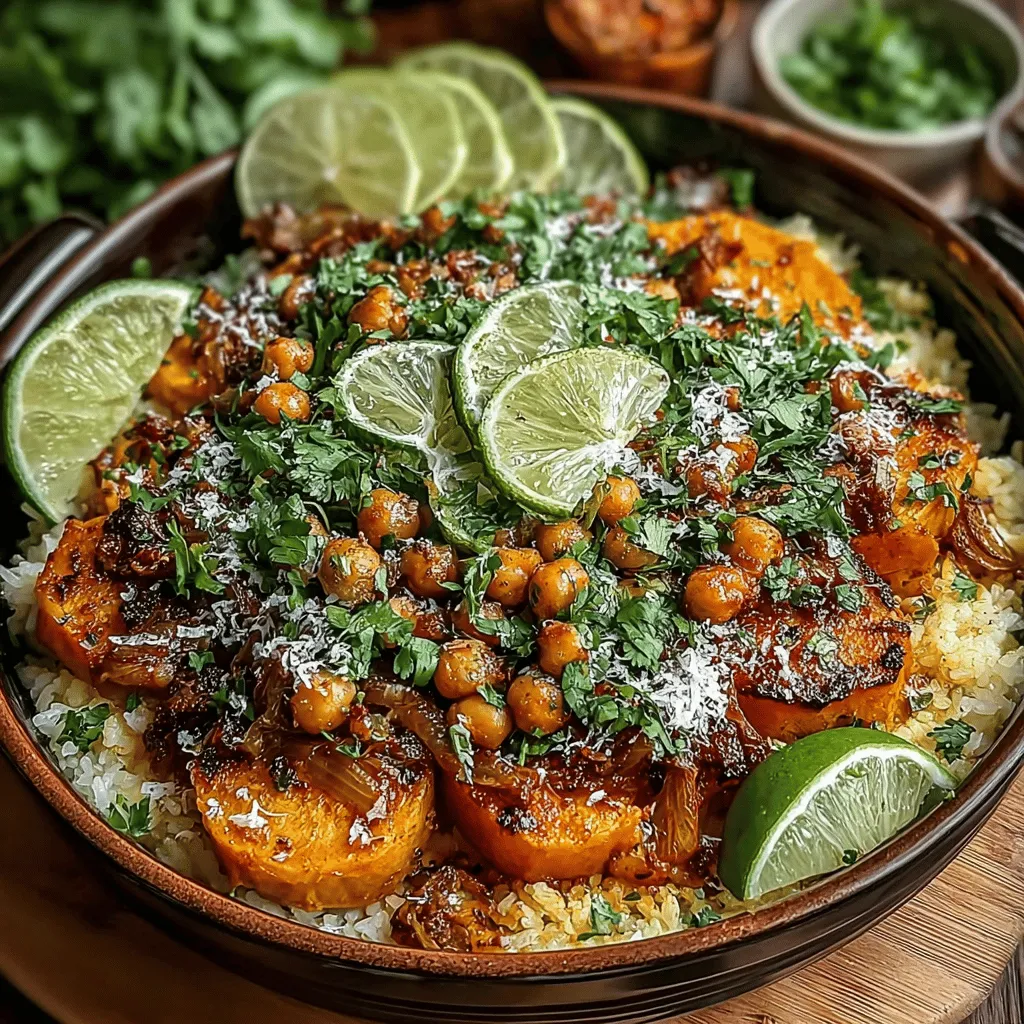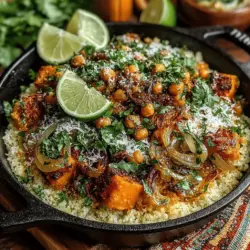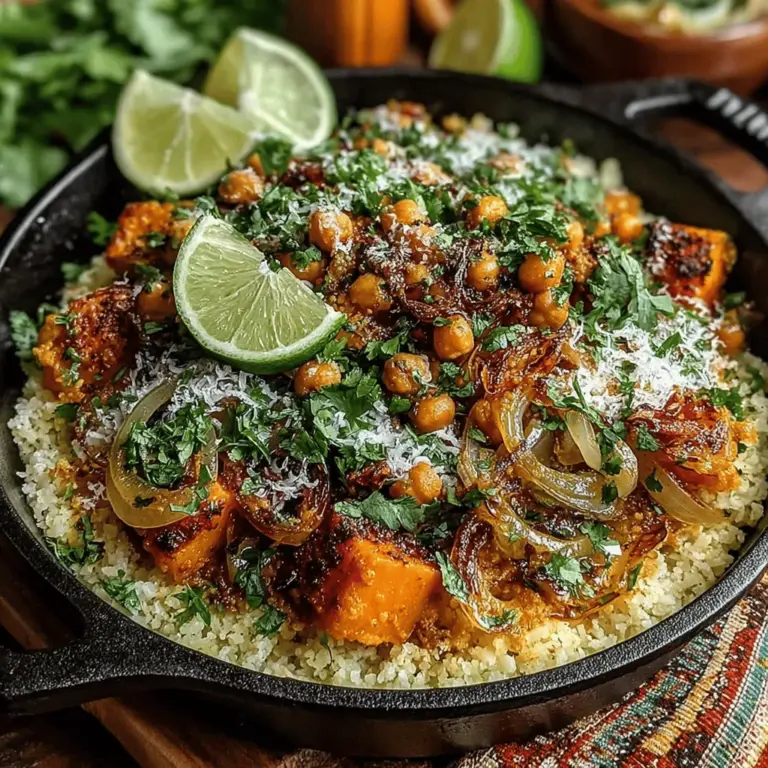Spicy Sweet Potato & Chickpea Masala Bowls: A Flavor-Packed Culinary Experience
In the realm of wholesome and delicious meals, Spicy Sweet Potato & Chickpea Masala Bowls stand out as a vibrant dish that is both nutritious and incredibly satisfying. This recipe combines the natural sweetness of roasted sweet potatoes with the hearty texture of chickpeas, all enveloped in a rich and aromatic masala sauce. Perfect for a weeknight dinner or meal prep, these bowls are not only easy to prepare but also packed with flavor and health benefits.
The appeal of Spicy Sweet Potato & Chickpea Masala Bowls lies in their harmonious balance of flavors and textures. The dish features sweet, spicy, and creamy elements that work in unison to create a delightful dining experience. The sweet potatoes provide a comforting base, while the chickpeas add protein, making this bowl a fulfilling option for both vegetarians and meat-eaters alike. With a variety of spices and the creaminess of coconut milk, each bite is a burst of flavor that excites the palate.
Understanding the Ingredients
Before diving into the preparation of this delectable dish, it’s essential to understand the key ingredients that contribute to its unique taste and nutritional value.
Sweet Potatoes: Nutritional Benefits and Versatility
Sweet potatoes are the star of this recipe, not only for their sweet flavor but also for their impressive nutritional profile. Rich in vitamins A and C, fiber, and potassium, sweet potatoes are a powerhouse of nutrients that support overall health. Their natural sweetness complements the spices used in the dish, creating a delightful contrast that elevates the entire meal. Additionally, their versatility in cooking allows for various preparation methods, whether you choose to roast, mash, or steam them.
Chickpeas: A Protein Powerhouse
Chickpeas, also known as garbanzo beans, are another essential ingredient in this recipe. They are an excellent source of plant-based protein, making them a staple in vegetarian and vegan diets. Chickpeas are loaded with dietary fiber, which aids in digestion and helps maintain a feeling of fullness. Their nutty flavor and firm texture provide a satisfying bite, making them a perfect complement to the soft and sweet roasted sweet potatoes.
Aromatics: Building Flavor with Onion, Garlic, and Ginger
The foundation of any great masala dish lies in its aromatics. In this recipe, onion, garlic, and ginger play a crucial role in developing complex flavors. Onions add sweetness and depth, while garlic brings a savory punch, and ginger contributes a warm, zesty note. Together, these ingredients create a fragrant base that enhances the overall taste of the dish. The cooking times for each aromatic are important; onions should be sautéed until golden to caramelize, garlic should be cooked until fragrant but not burnt, and ginger should be added at just the right moment to maintain its bright flavor.
Coconut Milk: Creaminess and Balance
Coconut milk is a key ingredient in this recipe, lending a luxurious creaminess that balances the heat from the spices. Not only does it enrich the sauce, but it also adds a subtle sweetness that complements the other ingredients beautifully. Coconut milk is also a great source of healthy fats, making this dish both satisfying and nourishing. Its creamy texture helps to round out the spiciness, ensuring that each bite remains enjoyable without overwhelming the palate.
Preparing the Spicy Sweet Potato & Chickpea Masala
Now that we’ve explored the components that make up this delicious recipe, it’s time to delve into the cooking process. Preparing Spicy Sweet Potato & Chickpea Masala Bowls involves several key steps that ensure the flavors meld perfectly and the textures are just right.
Step 1: Roasting Sweet Potatoes
The first step in creating this dish is to roast the sweet potatoes. Roasting not only enhances their natural sweetness but also develops a pleasing caramelization that adds depth to the dish. To achieve perfect roasted sweet potatoes, start by preheating your oven to 425°F (220°C). Cut the sweet potatoes into even cubes to ensure they cook uniformly. Toss them in a bit of olive oil, salt, and pepper, then spread them out on a baking sheet in a single layer.
Roasting time typically ranges from 25 to 30 minutes, but it’s important to check for doneness by piercing them with a fork. They should be tender and slightly crispy on the edges. Flipping the sweet potatoes halfway through roasting helps achieve an even golden brown color and prevents sticking.
Step 2: Toasting Spices
While the sweet potatoes are roasting, it’s time to prepare the spices that will bring the masala to life. Toasting spices is a technique that elevates their flavor profile, releasing essential oils and intensifying their aroma. In a dry skillet over medium heat, add your choice of spices, such as cumin seeds, coriander seeds, and turmeric. Toast them for a few minutes, stirring frequently, until they become fragrant.
This process not only enhances the flavor of the spices but also allows the heat to unlock their full potential. Once toasted, remove the spices from the skillet and set them aside to cool before grinding them into a fine powder. This freshly ground spice blend will be the backbone of your masala.
Step 3: Sautéing Aromatics
With the sweet potatoes roasting and the spices toasted, it’s time to build the flavor base for the masala. In the same skillet used for toasting the spices, add a drizzle of olive oil and heat it over medium heat. Begin by adding diced onions, sautéing them until they become translucent and start to caramelize, which usually takes about 5 to 7 minutes.
Next, incorporate minced garlic and grated ginger into the pan, cooking for an additional minute. This step is crucial, as it allows the flavors to meld and the aromatics to release their oils, creating a fragrant base for the masala. Be careful not to let the garlic burn, as it can turn bitter and affect the overall taste of the dish.
As you sauté the aromatics, you’ll notice how the kitchen fills with enticing aromas, hinting at the delicious meal to come. Once the onions are golden and the garlic and ginger are fragrant, it’s time to add the toasted spice blend along with the chickpeas and coconut milk, allowing the masala to come together beautifully.
With these initial steps completed, you are well on your way to crafting a flavorful and satisfying Spicy Sweet Potato & Chickpea Masala Bowl. The combination of roasted sweet potatoes, protein-packed chickpeas, and a rich, spiced sauce will undoubtedly create a meal that delights the senses and nourishes the body. In the next part of this article, we will delve deeper into the crafting of the masala and how to assemble your bowls for a visually appealing and delicious presentation.

Integrating Spices: The Role of Each Spice in the Overall Flavor Profile
The heart of any great masala dish lies in its spices. In the Spicy Sweet Potato & Chickpea Masala Bowl, the spices used play a crucial role in developing a rich and complex flavor profile that tantalizes the taste buds. Here’s a closer look at the key spices and their contributions:
Cumin Seeds
Cumin seeds are essential for adding a warm, earthy flavor to this dish. They bring a nutty aroma that pairs beautifully with both sweet potatoes and chickpeas. Toasting the seeds before grinding releases even more of their aromatic oils, enhancing their flavor.
Coriander
Coriander adds a bright, citrusy note that balances the warmth of cumin. Its slight sweetness complements the natural sugars in sweet potatoes, creating a harmonious blend. Ground coriander can be used for convenience, but using fresh coriander seeds and grinding them will yield a more vibrant flavor.
Turmeric
Turmeric is not just a colorful addition; it also imparts a warm, slightly bitter taste. Known for its anti-inflammatory properties, turmeric’s golden hue elevates the visual appeal of the dish while enriching the flavor profile.
Garam Masala
This quintessential Indian spice blend brings warmth and depth to the masala bowl. Each variation of garam masala has its unique blend of spices, typically including cardamom, cinnamon, and cloves. Adding this towards the end of cooking allows its potent flavors to shine through without becoming overpowering.
Red Chili Powder
For those who enjoy a kick, red chili powder is the spice to turn up the heat. Adjust the quantity based on your heat tolerance. It complements the sweetness of the potatoes and the creaminess of the coconut milk, creating a balanced dish.
Incorporating Coconut Milk and Chickpeas: How This Step Brings Everything Together
Once the spices have been incorporated and the aromas fill your kitchen, it’s time to add the chickpeas and coconut milk. Chickpeas add a wonderful creaminess and boost the protein content, making this dish hearty and satisfying.
Coconut milk contributes not only to the creaminess but also to a subtle sweetness that balances the spices. This combination creates a luscious sauce that envelops the sweet potatoes and chickpeas, allowing the flavors to meld beautifully.
Importance of Simmering for Flavor Development
After adding the coconut milk, bring the mixture to a gentle simmer. This step is crucial as it allows the spices to infuse their flavors into the sauce and the chickpeas to soften slightly. Simmering also helps thicken the sauce, creating a rich, comforting texture that coats every bite. Aim for about 10-15 minutes, stirring occasionally, to ensure nothing sticks to the bottom of the pan.
Combining the Ingredients
Folding Roasted Sweet Potatoes into the Masala: Ensuring Even Distribution Without Mashing
Once your chickpeas are tender and the sauce is bubbling with flavor, it’s time to fold in the roasted sweet potatoes. Use a spatula to gently combine the sweet potatoes with the chickpeas and sauce. The goal is to ensure an even distribution without mashing the sweet potatoes into a purée.
This gentle folding technique maintains the integrity of the sweet potato chunks, providing a delightful texture contrast in every bite.
Final Seasoning: Tips for Adjusting Flavors to Personal Preference
Before serving, taste the dish and adjust the seasoning as necessary. You might want to add a pinch of salt, a squeeze of lime juice for brightness, or more chili powder for additional heat. This is your opportunity to make the dish your own, so feel free to experiment until you find the perfect balance that suits your palate.
Serving Suggestions
Base Options: Rice vs. Quinoa—Nutritional Comparisons and Flavor Pairings
When it comes to serving your Spicy Sweet Potato & Chickpea Masala, the choice of base can elevate the dish even further.
– Rice: A classic option that pairs well with the creamy masala, jasmine or basmati rice provides a fragrant backdrop. Both types of rice are rich in carbohydrates, making them a filling option.
– Quinoa: For a protein-packed alternative, quinoa is an excellent choice. It’s gluten-free and contains all nine essential amino acids, making it a complete protein source. Its slightly nutty flavor complements the spiced masala beautifully.
Choose the base that fits your dietary needs and preferences, ensuring a satisfying meal.
Presentation Tips: How to Create an Attractive Serving Bowl
Presentation plays a significant role in enhancing the overall dining experience. When serving your masala bowls, consider the following tips:
– Use wide, shallow bowls to allow the vibrant colors of the dish to shine.
– Layer your base first, then generously spoon the masala over the top.
– For a touch of elegance, drizzle a bit of coconut milk or yogurt around the edge of the bowl for contrast.
Garnishes: The Role of Fresh Cilantro and Lime Wedges in Enhancing Flavor
Don’t forget the finishing touches! A sprinkle of fresh cilantro adds a burst of freshness and a pop of color, elevating the dish visually and flavor-wise. Lime wedges on the side provide a zesty kick that can be squeezed over the top before enjoying, enhancing the dish’s depth of flavor.
Nutritional Insights
Overview of the Dish’s Nutritional Content
This Spicy Sweet Potato & Chickpea Masala Bowl is not only flavorful but also packed with nutrients. Here’s a quick breakdown:
– Sweet Potatoes: Rich in vitamins A and C, fiber, and antioxidants, they support immune function and promote healthy skin.
– Chickpeas: A fantastic source of plant-based protein and fiber, they help keep you full and provide essential nutrients like iron and folate.
– Coconut Milk: While higher in calories, it contains healthy fats that can aid in nutrient absorption and provide energy.
Benefits of a Plant-Based Diet Highlighted by This Recipe
Incorporating plant-based meals like this masala bowl into your diet can have numerous health benefits. These include improved heart health, better weight management, and reduced risk of chronic diseases. This recipe showcases how delicious and satisfying plant-based eating can be, encouraging you to explore more vegetarian or vegan options.
Discussion on Portion Sizes and Serving Suggestions for Varied Dietary Needs
When it comes to portion sizes, consider your dietary needs. For a lighter meal, serve a smaller portion of the masala over a generous bed of greens. For a heartier option, increase the serving of chickpeas and sweet potatoes. Adjusting portion sizes can help accommodate different dietary requirements, whether you’re preparing a meal for weight management or fueling up for an active day.
Conclusion
In summary, the Spicy Sweet Potato & Chickpea Masala Bowl is a remarkable dish that combines healthfulness, flavor, and satisfaction. With its vibrant spices, creamy coconut milk, and hearty chickpeas and sweet potatoes, this recipe is not only easy to prepare but also incredibly adaptable to various tastes and dietary needs.
Don’t hesitate to experiment with different spices or vegetables to make this dish your own. Whether you serve it over rice or quinoa, with or without garnishes, you’ll enjoy a deliciously satisfying meal that you can feel good about. Embrace the warmth and comfort of this masala bowl, and let it inspire you to explore more culinary adventures in your kitchen.

